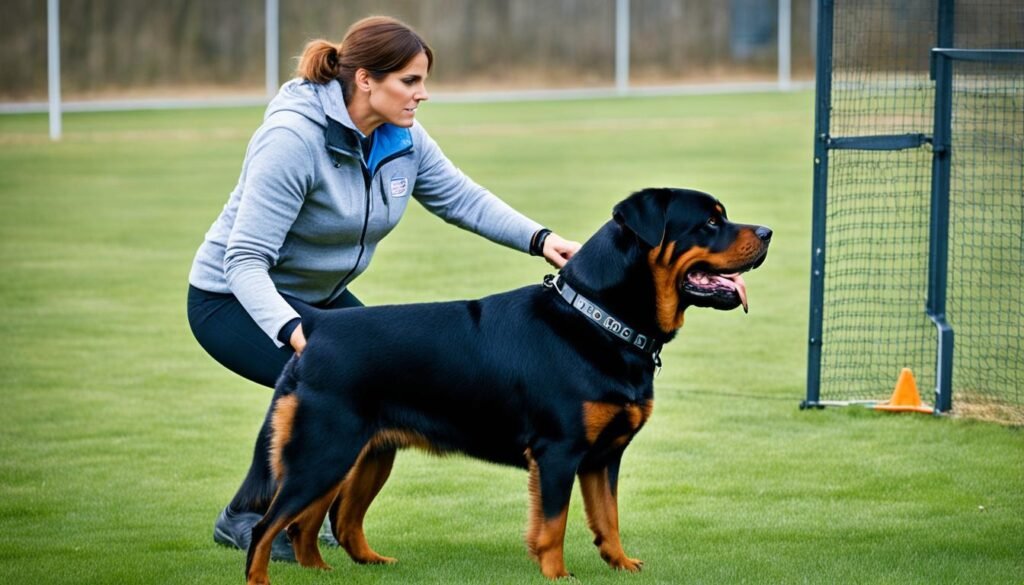When I adopted my Rottweiler, Max, I was excited to welcome a new furry member into my family. Having heard about their protective nature, I wondered how Max would fit into our household. Little did I know, he would soon prove to be the ultimate guardian and companion.
One evening, as I was sitting on the couch engrossed in a movie, I suddenly heard a loud noise coming from outside. My heart raced as I peered through the window, trying to make sense of the commotion. Just as I was about to dismiss it as a neighborhood disturbance, I saw a stranger attempting to break into my neighbor’s house.
Without a second thought, Max leaped into action. His protective instincts kicked in, and he bolted towards the intruder, barking fiercely. The would-be thief, startled by Max’s intimidating presence, fled the scene in a hurry.
I was amazed by Max’s fearlessness and unwavering loyalty. It was a true testament to the natural protective nature that Rottweilers possess. In that moment, I realized that I had not only gained a loving pet but also a devoted guardian who would go to great lengths to protect our family.
Over time, I learned that Max’s guarding abilities were not limited to external threats. Whether it was keeping a watchful eye on our children or ensuring the safety of our home, Max’s protective instincts were always on high alert. But what truly set him apart was his ability to balance his protective nature with gentleness and affection.
Rottweilers, like Max, are indeed a protective breed. Their loyalty knows no bounds, and they will fiercely guard their loved ones when the need arises. However, it is important to note that their guarding behavior can be shaped through proper training and socialization. With the right guidance, Rottweilers can become loving and well-rounded companions.
Key Takeaways:
- Rottweilers have a natural protective nature and are known for their loyalty to their families.
- Proper training and socialization are crucial in shaping a Rottweiler’s behavior and ensuring they can discern between genuine threats and harmless situations.
- Rottweilers can make excellent family pets, being both gentle and protective.
- Their intelligence and adaptability make them versatile dogs capable of fulfilling various roles.
- Understanding and respecting their protective traits can lead to a rewarding relationship with this magnificent breed.
Rottweilers: A Brief History of a Protective Breed
Rottweilers have a fascinating history that can be traced back to ancient Rome. These dogs were valued as both herding and guarding animals, accompanying Roman legions as they crossed the Alps and serving as protectors of livestock and camps. In fact, the name “Rottweiler” is derived from the German town of Rottweil, where these dogs played a crucial role in herding cattle.
Over the centuries, Rottweilers have maintained their distinctive appearance and temperament. They have adapted to various roles, including serving as police dogs, search and rescue dogs, and working in other important capacities. This breed’s protective instincts and strong herding abilities have been passed down through generations, making them a breed renowned for their loyalty and dedication.
Despite their impressive history, Rottweilers are not just relics of the past. Today, they continue to excel in their protective and herding roles, showcasing their intelligence and versatility. From ancient Rome to modern times, Rottweilers have remained a steadfast and capable breed, valued for their unwavering loyalty and impressive working abilities.
Stay tuned for Section 3, where I will delve into the fascinating temperament of Rottweilers and how their protective nature complements their loyal and intelligent personalities.
Understanding the Temperament of Rottweilers

Rottweilers have a natural temperament that showcases their protective nature, loyalty, intelligence, and obedience. These qualities make them a sought-after breed for various roles, from family pets to working dogs.
One of the defining characteristics of Rottweilers is their instinct for guarding. They have a deep sense of loyalty and are fiercely protective of their families. Their strong protective nature can make them wary of strangers, but with proper training and socialization, they can learn to discern between genuine threats and harmless situations.
Intelligence plays a significant role in the temperament of Rottweilers. They rank among the top ten intelligent dog breeds, which makes them highly trainable. Rottweilers are quick learners and are eager to please their owners. With consistent and positive training methods, they can become obedient and well-behaved companions.
The Protective Nature of Rottweilers
Rottweilers possess a natural protective instinct that has been ingrained in them for centuries. They were originally bred as working dogs, tasked with guarding cattle and protecting their owners’ possessions. This protective nature has been passed down through generations, making Rottweilers excellent guardians.
However, it is essential to note that a Rottweiler’s protective nature should be nurtured and directed in a positive way. Early socialization and exposure to various environments help them develop confidence and learn to distinguish between friend and foe. This, coupled with proper training and consistent reinforcement, allows Rottweilers to become well-rounded dogs who can differentiate between a genuine threat and a harmless situation.
Rottweilers’ loyalty ties closely with their protective nature. They form strong bonds with their families and will go to great lengths to ensure their loved ones are safe and secure. This loyalty is one of the reasons why they are highly regarded as family dogs.
Intelligence and Obedience
When it comes to intelligence, Rottweilers shine. Their ability to problem-solve and learn quickly is remarkable. This intelligence, combined with their loyalty and protective instincts, makes Rottweilers a versatile breed capable of excelling in various roles.
Training a Rottweiler requires consistency, patience, and positive reinforcement. They respond best to reward-based training methods, where desirable behaviors are reinforced with treats, praise, or play. Their eagerness to please their owners makes training sessions enjoyable and productive.
Rottweilers thrive when given a clear sense of direction and purpose. Engaging them in obedience exercises, agility training, or advanced commands helps them utilize their intelligence and keep them mentally stimulated.
Understanding the temperament of Rottweilers is key to appreciating their unique traits as a breed. Their protective nature, loyalty, intelligence, and obedience make them wonderful companions when properly trained and socialized. With the right guidance, Rottweilers can be loving family pets and trusted guardians for those willing to embrace their true nature.
Training and Socialization of Rottweilers

Proper training and socialization are key factors in shaping a Rottweiler’s behavior and ensuring they become well-adjusted and balanced dogs. Early training and socialization, starting from a young age, are particularly important in preventing fear and aggression.
Consistent training is essential for establishing clear boundaries and expectations for your Rottweiler. Positive reinforcement techniques, such as rewarding desired behaviors with treats or praise, are highly effective in training Rottweilers. Avoid using harsh or punitive methods, as they can cause fear and anxiety in these sensitive dogs.
Training sessions should be kept short, fun, and engaging to maintain your Rottweiler’s interest and focus. Incorporating play into training activities can also be a great motivator for your dog.
In addition to training, socializing your Rottweiler in various settings is crucial for their development. Expose them to different environments, people, animals, and experiences to help them become comfortable and confident in a variety of situations.
Building Positive Associations
During training sessions and socialization experiences, it’s important to be patient and positive. Encourage and reward your Rottweiler for good behavior, and redirect or ignore unwanted behaviors. This positive approach helps to build trust and strengthen the bond between you and your dog.
Seek Professional Help, if Needed
If you’re unsure about how to train your Rottweiler or encounter specific behavioral challenges, consider seeking guidance from a professional dog trainer or behaviorist. They can provide expert advice tailored to your dog’s needs and help you address any issues effectively.
Remember, training and socialization are ongoing processes throughout your Rottweiler’s life. With patience, consistency, and positive reinforcement, you can help your Rottweiler become a well-behaved and well-rounded companion.
Conclusion
Rottweilers are not inherently aggressive but rather possess a natural protective instinct, making them excellent companions for families seeking a loyal and loving pet. With proper training, socialization, and a positive environment, their behavior can easily be molded into that of a well-adjusted and gentle family dog.
These magnificent animals showcase remarkable intelligence and adaptability, enabling them to fulfill various roles beyond being just a family pet. Throughout history, Rottweilers have proven themselves as hardworking and reliable dogs, serving as service dogs, therapy dogs, police dogs, and more.
Understanding and respecting the true nature of Rottweilers is key to fostering a rewarding relationship with these incredible creatures. Embracing their protective traits while providing them with the training and socialization they need will ensure they grow into loving, gentle, and devoted companions, bringing joy and comfort to their families.
FAQ
Are Rottweilers naturally protective dogs?
Yes, Rottweilers have a natural protective instinct that makes them loyal and vigilant guardians. They are known for their protective traits and are often used as working dogs in roles such as police dogs and guard dogs.
Do Rottweilers make good family pets?
Rottweilers can make excellent family pets. They are loving, loyal, and protective of their loved ones. However, it is important to provide them with proper training, socialization, and a positive environment to ensure their well-rounded development.
How can I train and socialize my Rottweiler?
Training and socialization are crucial for shaping a Rottweiler’s behavior. Early socialization, starting from a young age, can help them become well-adjusted and prevent fear and aggression. Consistent training using positive reinforcement techniques is essential for establishing clear boundaries and expectations.
Are Rottweilers aggressive?
Rottweilers are not inherently aggressive. However, their protective instincts can make them wary of strangers. With proper training, socialization, and a positive environment, Rottweilers can become gentle and well-behaved dogs.
Can Rottweilers be used as service dogs?
Yes, Rottweilers can be trained to serve as service dogs. Their intelligence, loyalty, and protective nature make them well-suited for various service roles such as assistance dogs and therapy dogs.
